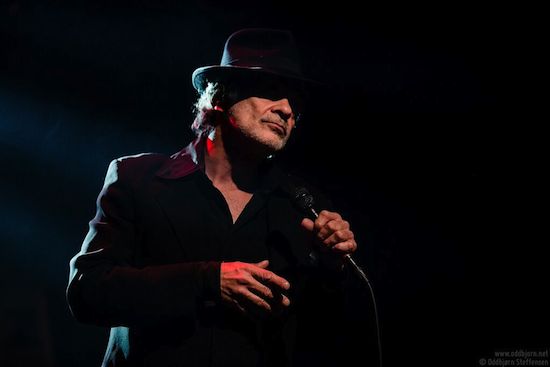Photo: Oddbjørn Steffensen/Nattjazz
Running since 1973, Bergen’s Nattjazz (Nightjazz) festival has an understandable bias towards Norwegian artists, but also harbours a healthy invasion of international players. Fortunately, a piscine stench doesn’t linger inside USF Verftet, a converted sardine factory, ideally positioned on the seafront. It’s one of those classic arts venues, housed in old functional structures, re-invented as a performance space. Its three stages are a) in close proximity to each other and b) insulated from external sound spillage.
The Røkeriet is the largest hall, though even this space allows for a certain degree of intimacy. The Argentinian tango weirdo Daniel Melingo is able to both project outwards to the back rows, and commune with his select clan of shape-throwing dance-gliders, who softly gyrate close to the lip of the stage. It’s difficult to avoid the obvious comparison with Tom Waits, when attempting to recommend his general individuality to the uninitiated. Melingo tilts his hat, strikes distorted poses and slinks around the stage, a perverse administrator of tango values, his voice a low-strung conduit for sleazily romantic drama.
Towards the end, he removes a shoe, slips off his sock and crumbles in-between-toe detritus over the frontward dancers. For the remaining third of the set, he parades around with a bare pedal extremity. His reverberant electric guitarist plays musical saw on a few numbers, heightening the ghostly sense of cracked nostalgia. Melingo is a showman in his exaggerated delivery, both sonically and visually, but he also has the air of a terminal introvert, playing for himself as he wanders distractedly behind the stage curtains, emerging to spout a few more decadent couplets. It’s as if his private bedroom twirlings are translated into a stagey projection.
In the same hall, Norwegian bassist Arild Andersen presents his homage to Charlie Mingus with a boldly propellant sextet. The gig is dedicated to the memory of a famed Oslo appearance by the monstrous Stateside bassman and composer 50 years ago.
Andersen launches into ‘So Long, Eric’ with a swinging fervour, shocking with a lustier approach than that which we’re accustomed to with his windswept, mournful ECM Records output. Eivind Lønning shoots out a frazzling trumpet solo on ‘Better Git It In Your Soul’, the steaming intensifying, Petter Wettre issuing an urgent tenor saxophone gush, drummer Gard Nilssen rolling out brief solos to alternate with the barrelling theme.
Colours and tones scintillate on ‘Fables Of Faubus’ and ‘Haitian Fight Song’ opens with the bass completely alone, eloquently rugged, before ‘Take The A Train’ rolls in, highlighted by an unusual twinned bass clarinet section. Andersen makes no radical alterations or additions to the compositions, he just roars through this wonderful songbook with complete enthusiasm, illuminating devotion, and a charging, positive power.
That was in the main room, but it was the jazz-clubby, medium-sized Sardinen that revelled in the best habitat, with its casual tables and informal spread. Here, Agbaland led an evening that turned out to be the epitome of meditational music.
A surprisingly hushed crowd gathers to feed on this trio’s carefully arrayed ritual of sound. Percussionist Terje Isungset’s drumset is surrounded by wooden salami-hangers, cowbell rows strung slightly above floor level, and uploaded sacks of rescued detritus, tinkered with delicately on his drumheads. Trumpeter Per Jorgenson might be indebted to global searchers Don Cherry and Jon Hassell, but he’s maybe a father figure to the younger Norwegian trumpeter Arve Henriksen, both in his tone and his penchant for vocalised harmonics. Keyboardist Sigbjorn Apeland is a rare exponent of prepared Fender Rhodes electric piano, poking its exposed innards with hands and spatula. Birdsong and jaw harp lead into an alternative Brazilian coasting, getting raunchy towards the set’s end, trumpet blurting, drums clacking and organ going for full-on Dr. Phibes eeriness.
Another kind of sparseness operated upstairs in the even smaller Studio nook, with the Norway-based Japanese pianist Ayumi Tanaka sharing some Morton Feldman qualities, making magnificent pauses in collusion with with her trio colleagues, bassman Christian Meaas Svendsen and drummer Per Oddvar Johansen. Tanaka splinters hard shards, twin bows are needed for maximum string-groaning and finger percussion adds to the endlessly building tension between pauses and sporadic sound-events, the silences being of equal significance. The threesome segue into a more conventionally dense, though angular, number, making an exquisite involvement with the placement of space, guiding our sideways slide into pure abstract thought.
<div class="fb-comments" data-href="http://thequietus.com/articles/18048-festival-report-nattjazz-live-review” data-width="550">


